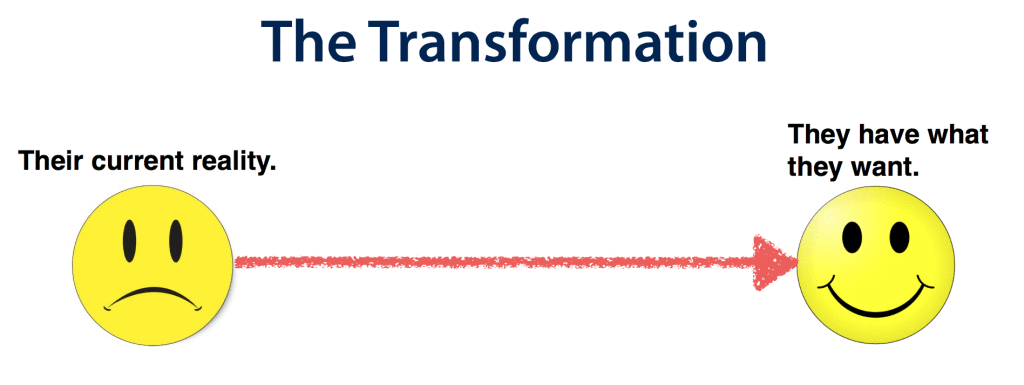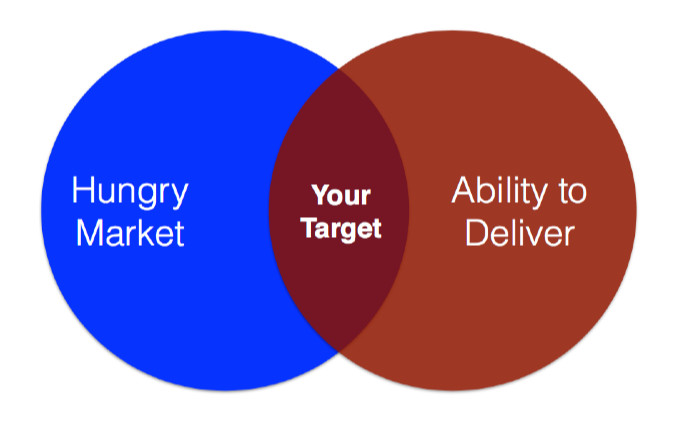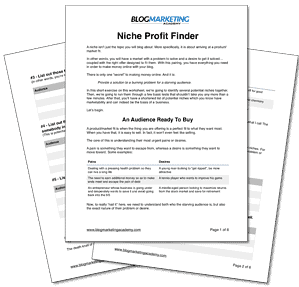In This Post…
If you’re reading this, then I’m going to assume you fall into one of these 3 categories:
- You are looking to start an online business and still need to find your niche.
- You have a blog but still have concerns on whether your niche is right or has sufficient business potential.
- You have a blog niche in mind (or already in progress), yet you’re concerned it is too broad.
If this is you, then please keep reading.
I want to turn the idea of finding your blog niche on it’s head. I want to make it simpler.
It is all too easy for the niche selection process to get stuck in the weeds of endless keyword research, indecision and self-doubt.
Let’s try a different approach to it…
The Niche – Redefined
First, we need to define our terms so that you and I are on the same page.
When most bloggers talk about “niche selection” or “find your niche“, what they’re referring to is deciding what their blog topic is. What are they going to talk about? The idea here is that if you choose the right topic and use the right keywords in some magic combination, then visitors will magically appear and Google will love you.
Well, it rarely works that way. It leaves too much to luck and chance. Plus, it isn’t laser-focused on what our true goal here is: An online business which actually generates revenue.
Traffic without purpose is a waste of time.
Our goal here is to generate BUSINESS.
To that end, we must leave the traditional ideas of “choosing a niche” behind and instead think about it in terms of products and markets.
This is often called Product/Market Fit.

Let’s further define a few terms:
Market:
A market is a group of people where their uniting factor – that thing which defines them as a group – is an active seeking of a solution to a problem or desire. They have a need or want… and they are looking for a solution for it. They also have the ability and a willingness to pay for that solution.
Product:
The product will be a delivery mechanism for the solution this market is seeking. It could be an info product, a physical product, a service, etc. That product will be a delivery mechanism for a TRANSFORMATION, which is moving them from their current reality to a new reality which they desire.
Offer:
The outward presentation of a product, potential product, or service. It includes the features, the benefits, the price, the guarantee, bonuses (if any), etc.
So, what we are looking for here is not a niche, in the sense of “what to blog about”. Instead, we’re looking for a MARKET, which is a group of people looking for a specific outcome. Then, we’re looking to find the offer which directly FITS them.

Now, there’s two questions we need to look at here in order to arrive at this fit:
- What do you have the ability to deliver?
- Is there a hungry market there to deliver to?
Let’s go into those two things further…
Use the Niche Profits Finder to walk you through a
specific process for identifying profitable niche markets.
- The exact components to what makes a niche profitable
- The 5 Lists For Profits to identify potential niches which are the right fit FOR YOU
- The 2-step Audience “Drill Down” to ensure you don’t go too broad
- 5 Specific Niche Tests to run your ideas through to see if they can be profitable (each test takes less than 3 minutes to do)
What Makes A “Good” Market?
You’ve no doubt seen the usual “hot” markets online. Things like making money online, dating, weight loss… yada yada. But, why are those markets so hot? Well, the answer to that lies in breaking down the definition of a market that I gave to you up above.
The 4 big factors of a “good” market:
- A group of people with a common desire or common problem that is capable of being fulfilled.
- They are actively seeking a solution to that desire or problem.
- They have the ability to pay for it.
- They have a willingness to pay for it.
Let’s go further into these 4 factors:
#1 – A group of people with a common desire or common problem that is capable of being fulfilled.
I use the word “transformation” a lot, because a good market is aligned around the delivery of one.

Now, this transformation has to be something that CAN be fulfilled. If it is simply an interest that has no real goal to it, your life will be harder. Such markets would be sports news, politics, celebrity gossip, and most any news-oriented niche. They may be strongly interested in the subject the news covers, but it isn’t necessarily something they DO anything about. It doesn’t align around any kind of solution, so these markets usually have to resort to banner advertising to make any money and… that sucks.
Markets which align around a transformation and something CAN be done about them are:
- Making money
- Fitness
- Dating
- Prepping
- Health (or handling a specific condition, alleviating symptoms)
Of course, there are many more of them. The point is, there IS a solution to be had. You take the “make money” niche and, on one end you don’t have money and the other one you have money. It is a direct, clear, measurable outcome. For dating, on one end you have no mate and the other end you do. Once again, it is a crystal clear outcome.
Your best markets are ones which are aligned around a transformation – and something can be done about it.
Also, the people need to be aware of it and actively seeking a solution. It is always much tougher if you’re in a position where you have to convince people they have a particular problem so you can solve it for them. Not only is that more difficult, but it can be borderline shady. So, the solution or outcome being delivered needs to be clear to them already and they need to want it. They might not know how to get it, but they know what the outcome looks like and they want it.
#2 – They are actively seeking a solution to that desire or problem.
If people aren’t looking for it, it isn’t a market. So, what are some good indicators of a market where the people are actively looking for solutions?
- Paid advertising to reach those people. If you see paid advertising from product providers clearly trying to reach people in that market, then you know money is flowing.
- Competing offers. A market where there is no competition is scary indeed. Never be scared of competition. Their presence is a good indicator.
- Magazines on the topic. Those magazines wouldn’t remain in business if there was no money flowing there. Especially magazines which contain paid advertising.
- Keyword search volume. Way too many bloggers get too overly focused on this, thinking there’s some magic threshold in search volume that makes the difference between success or failure. That just isn’t true. You want to see some search volume, however the other things we’re discussing here are far more important and will usually go hand in hand.
- Active communities and social groups.
Take a look at Google Trends and see what kind of activity is going up with the market. Run some keywords through some keyword tools. The Google Keyword Ideas tool (in Google Ads) can be useful. I also like KWFinder, from Mangools.
There are no fancy thresholds to any of this. No specific numbers where you can make a concrete judgement. What you’re doing here is doing a lot of surfing of the Internet and looking at these various factors, with the result being to get a gauge of how active any particular market is.
Do you see active communities, people asking questions, decent search results, perhaps some magazines? Do you see competing, paid products? Does it appear as if they are selling? Do you see paid ads attempting to reach these people? All of these thing combine to give you a strong sense of what’s happening.
#3 – Ability to pay for it.
We’re not talking here about people being “cheap”. We’re talking about logistical problems.
For instance, if you were targeting children, there would be an obvious logistical problem in that it is the parent who makes the purchasing decision. It doesn’t mean you must avoid it, but it is something you need to confront and have a plan for.
There may also be legal concerns in some markets, such as medical. Or if your target market is primarily in a third-world country where they don’t have much money or access to credit cards, that would represent an issue.
#4 – Willingness to pay for it.
Generally speaking, if a person in your target market doesn’t buy your solution, it is because you haven’t made the offer good enough. You simply haven’t made a solution to their problem worth enough to them to motivate them to spend any money. That’s a marketing problem.
In terms of the market in general, you simply want to look for indicators that money is flowing. Look for competing products and whether or not they are selling. Do the people in that market have a proven record of making purchases?
Also, I would tend to avoid markets which have a natural friction to spending money, such as a market defined by frugalness. I’ve seen a lot of bloggers build up blogs about doing things cheaply, then wonder why it is hard to monetize. Well, it is probably because you’ve attracted an audience who are trying to not to spend any money. You’re literally at odds with your own brand, in that case.
(NOTE: We have a course in our library to help you create and verify your business plan – on one page. It is the next step beyond just figuring out your niche.)
What Markets CAN You Serve? (The 5 Lists For Profits)
We’ve talked about what a hungry market looks like, but just because a market is hungry for something doesn’t mean you are personally equipped to be able to serve them.
So, the ultimate starting point here is to look at what exactly you have the ability to help people with.

Now, this is something that only you can answer. However, there are 5 questions you can answer that will help brainstorm your opportunities. I call these the 5 Lists for Profits.
#1 – List out the topics that you are passionate about.
Now, I’ll be the first to tell you that passion isn’t the most important factor here. We’re looking for product/market fit, and nowhere in that pairing does it matter how personally thrilled you are with the market. There are a lot of people out there making a good living with things they’re bored by.
However, a passion for something is a good driver for things.
What do you REALLY enjoy doing? What would you do by choice even if you were not getting paid for it?
#2 – List out those things that you would be motivated to learn really well.
This means that it is a potential market that you are highly motivated to become an expert in, even though you are not currently.
#3 – What are you good at, even if you’re not passionate about it?
What skills do you have? What do you currently do for a living? What things do people routinely ask you for help with because they know you’re good at it?
Many of us are good at something that we may not be in love with. Good fodder for this could be your day job. In your ideal world, you may wish to leave your day job and do something completely different, but most likely what you do at work is something you know how to do well even if you’re not passionate about it.
So, be honest with yourself. List your skills and the things you can do for others, even if it isn’t something you love doing.
#4 – List out those markets you believe might be good markets, and you know somebody in your social circles who is good at it.
You may see a potential hungry market there, but you don’t feel you personally have the ability to serve them. Thing is, maybe you know somebody who does.
List those things out. You never know… perhaps you can devise some kind of partnership idea with them where they are the “expert” and you take care of the web stuff.
#5 – List out those markets that you clearly see that people are buying.
Look in your life and experience and list out those areas where you clearly observe that people are buying stuff and have a demonstrated demand.
How To Define Your Market (Not Your Topic)
I hope, by now, I’ve successfully disabused you of thinking of your blog niche as simply the topic you blog about. Instead of that, we’re talking about product/market fit.
Of course, to complete that pairing, we have to come up with a product offer which fits your chosen market, but that’s an entirely different matter. At this point, all we’re doing is arriving at the market we wish to begin with.
Now, if we’re going to successfully switch our mindset here to thinking of this in terms of a MARKET and not simply our topic, then we should be specific in how we define it.
Define your market by WHO they are and WHAT they’re looking to achieve.
By doing this, we keep our eyes firmly on the transformation we serve.
Here’s several examples of markets where we are defining both WHO they are but also WHAT they’re looking to achieve:
- Full-time employees looking to build a flexible business on the Internet
- Small business owners who want a website that generates leads and sales on automatic
- Single guys looking for a date
- Women looking to lose weight after child birth
- Fathers looking to protect their families and wealth against economic collapse
- Casual stock investors looking to increase their profits
- Coaches looking to get more clients
- Students looking to pass a particular exam or certification
- Aspiring musicians looking to learn to play an instrument
- Parents looking to improve their relationship with their older children
The list could go on almost infinitely, but you can clearly see that these are all REAL markets, and they’re defined both by who they are but also what they’re trying to accomplish. In other words, it is their TRANSFORMATION.
In a future step of this process, you will get much more clarity on exactly what the transformation looks like. However, the important point here is that you need to define your niche based on the WHO and the WHAT THEY WANT.
It marks a very stark contrast to the usual, but highly incomplete idea of simply deciding what you want to blog about.
Common Confusions About Finding Your Niche (With My Responses)
Naturally, a lot of confusions and doubts swirl around this topic of niche selection.
What if you get it wrong? How do we know it will work out? How can you stand out when so many others are already doing it?
Natural questions – and they deserve answers.
So, let’s do it.
How Do I Know If My Niche Is Too Narrow or Too Broad?
This kind of question is usually the result of too much focus on search keywords and not enough focus on the transformation.
Certainly, if you’re worried primarily about search, then you’re going to easily get into the weeds about search volume, long-tail keywords… and just how “long tail” is enough. Certainly, search is an indicator of market activity, but I find that it is far simpler and gives far greater clarity if you look at the bigger picture of the hungry market and exactly what they’re looking for. If you define your market like I said above, it really helps.
The issue of “too broad” or “too narrow” usually comes from thinking of niche as merely your topic. If, instead, you focus on WHO you serve and WHAT THEY WANT (in other words, the transformation), then a lot of that confusion goes away.
If your blog is oriented around a very vague topic but no transformation, that’s when you can easily run into the issue of “too broad”. For instance, if you have a “personal development blog” and you think your niche is “personal development”, then you’re very likely going to go SPLAT on the wall of broadness. 😉 That’s a topic… and a broad one at that. Instead, define your blog by who they are and what transformation you serve. And, most likely, you’ll need to narrow things down to arrive at one.
(For further reading on that, check out How To Make Money In The Personal Development Niche (And Why Many Don’t))
What Niches Are Working And Pay Well?
I wanted to include this one simply so that I can highlight what a stupid question it is.
The mentality that leads to a question like this is not a mentality of service. It means you just want to make money without any real concept of the EXCHANGE that you’re providing for it.
The niches that will work for you will be found in the 5 Lists for Profits. It will be unique to you and what you can deliver upon. How can you expect to go into a niche, no matter how “good” the market is, and do well if you have no ability to deliver?
Any solid online business is based on true delivery of solutions to people who need or want them. That’s the foundation.
It is far less workable to simply arbitrage traffic or to rely on banner ads. It CAN work, but it is less reliable.
It isn’t the niche choice which defines how well your business will do. It is the pairing of how hungry that market is (see above) with how well you can deliver (also see above).
What If I Get My Niche Choice Wrong?
The fear of failure runs rampant in the world of online business among newbies. And, honestly, it is quite unnecessary. Is anything really bad going to happen to you if you make a wrong choice? Likely not. Very little that we do here is “life and death”. 🙂
So, if you find that your choice of market wasn’t a good fit for you, simply pivot and move on to something else. Not a big deal.
That said, I know a big part of this fear is the desire not to waste a lot of time on something which won’t work. But, realize, this isn’t a matter of luck. It isn’t as if you’re expected to put months of work into something which is a big “if”. Not at all.
There is a specific process I walk my students through to incrementally test out product/market fit. You do it in steps, with specific benchmarks to shoot for. It is also very targeted about how it works and doesn’t even involve blogging. We go right to the point, with a basic funnel for lead generation and a basic pre-offer. And we test the actual numbers to see if we have a fit. If we don’t, we either make adjustments and re-test… or we move on to a new idea.
I walk students through this process in the Business Building Bootcamp. In fact, that’s pretty much the entire point of the Bootcamp.
Once you’re done with it, you will have a proven product/market fit. And only THEN do you begin setting up a blog around it.
The secret is found in the sequence of actions… and unfortunately, most bloggers get it completely wrong by focusing on the wrong thing and doing things out of order.
With the process we cover in the Business Building Bootcamp, there is practically zero risk of finding yourself far down the road of blogging only to find your niche is wrong. It simply won’t happen.
What If My Niche Is Saturated? How Do I Stand Out?
Truth is, any really good niche is going to have a lot of people doing it already. Welcome to the human race. 😉 There are almost 7 billion people on this planet. The idea that you or I are going to have some unique idea that nobody has thought of is just… ludicrous.
The most important thing for you to think about is:
- Who will you serve?
- How will you serve them?
- What outcome will you provide for them?
- How can you do it better or different?
If you can answer those things and the market you’re looking at seems saturated, don’t worry about it. These days, it is easier than ever to get traffic. You will have to create some truly stellar content (we have strategies for this that don’t involve blogging with all your free time)… and then you need to be willing to invest in the growth of your business.
If you’re willing to invest to build your assets in a strategic and targeted way, you can build a presence in what you think is a saturated market. Most people aren’t willing to spend a dime on traffic and they will spin their wheels because of it. By being willing to utilize paid traffic (and we’re talking about as little as $5/day), you can make real headway into growing your email list and building a real presence.
Of course, the key is not to blindly throw money at it. You go in with a PLAN, and you build real assets while you do it.
Building up traffic in a busy niche is a matter of doing what most others in that niche aren’t willing to do. It will either involve time or money. Personally, I think money is the easier path. If you’re willing to utilize paid traffic, even in tiny budgets, you CAN build up in a busy niche. If you’re not willing to spend any money, it can still be done however it will involve far more time.
You’ll pay for it either way, either with your time or your money. But, rest assured, traffic CAN be gotten. Even if you go into a busy niche with a lot of competitors, you can totally make it happen.
But, I’m Not An Expert At Anything.
Certainly, a good niche for you is going to be a match between a hungry market and your ability to deliver what they want. If you don’t feel you have anything to offer of value, it can be quite paralyzing.
If you go through those 5 Lists for Profits, perhaps an idea will come to mind. Very often, the things we know how to do or do all the time are so normal to us that we don’t realize that other people might find it immensely valuable. Take stock in your own skills, your job experience.
Another aspect to keep in mind is that nowhere in the phrase “internet business” does it say you have to create big training courses. I have found that many people who wish to run virtual businesses get themselves stuck in this mindset that they have to create big informational training courses… because they see all the “gurus” doing it. And perhaps you don’t see yourself being that kind of guru.
And that’s totally fine!
Realize that an internet business is simply a business which gets its customers from the Internet rather than a physical storefront. You can operate a service business and use your blog as the main way to attract clients. Never discount these more “normal” business ideas of simply performing a service for somebody else. It might not be as sexy as a membership site with those ideas of you making money while you sleep, but it isn’t any less legit. Plus, fairly often, you can turn a service business into a more leveraged informational business down the road.
So, what can you DO for other people? Even if you need to limit your service area to the city in which you live, guess what? You can still use a blog to attract your clients and build that business.
Don’t let yourself get stuck into a limited idea of what a blog can do for a business, or what your online business is supposed to look like. There are a lot of ways to go here.
Use the Niche Profits Finder to walk you through a
specific process for identifying profitable niche markets.
- The exact components to what makes a niche profitable
- The 5 Lists For Profits to identify potential niches which are the right fit FOR YOU
- The 2-step Audience “Drill Down” to ensure you don’t go too broad
- 5 Specific Niche Tests to run your ideas through to see if they can be profitable (each test takes less than 3 minutes to do)
Got A Question? Need Some Assistance?
Have a question about this article? Need some help with this topic (or anything else)? Send it in and I’ll get back to you personally. If you’re OK with it, I might even use it as the basis of future content so I can make this site most useful.




